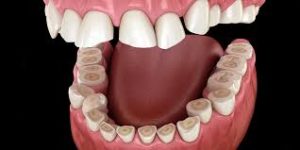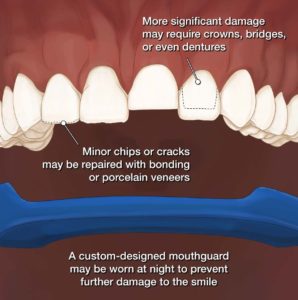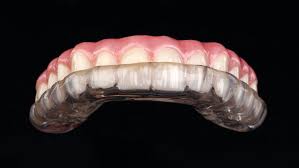WHAT IS BRUXISM?

Bruxism, is most commonly referred to as teeth grinding or teeth clenching. This is when a person tightly clenches their jaws together or grinds their teeth back and forth. Commonly done at night during sleep, but for some people, this can happen during the daytime as well.
Many people with nighttime bruxism don’t even realize they are doing it until either their dentist or hygienist identifies the problem, or when a sleeping partner notices noises at night and mentions it. We often see people with bruxism visit us for a chipped or cracked tooth only to find out that the underlying cause of the damage is nighttime teeth grinding.
Bruxism results in damage to the tooth’s surface, as well as complications in other areas of the body. Bruxism most often leads to cosmetic issues, like cracks, chips, and uneven surfaces of the teeth, sometimes so severe that teeth become shorter and shorter and eventually get ground down to the gum line. Left untreated, it can also cause chronic jaw pain, tension headaches, and other health problems.
CAN ANXIETY CAUSE BRUXISM?
Bruxism is considered a sleep-related movement disorder. While there is currently no clear-cut cause for bruxism, it is closely associated with stress and anxiety. Doctors believe that tooth grinding during the daytime or at night could very well be caused by stress.
The most common symptoms of teeth grinding include:
- Worn tooth enamel
- Flat-looking or flat-feeling teeth
- Chipped teeth
- Loose teeth
- Fractured teeth
- Jaw pain
- Tooth pain
- Tooth sensitivity
- Gum recession
- Bone recession around the tooth roots
- Hearing tooth tapping sounds during the night
- Having a bed partner report hearing grinding sounds at night
- Damage to the soft tissues on the inside of your cheeks
- Headaches, particularly in the morning
- Temple pain
- Waking up in the middle of the night
CAN TOOTH GRINDING LEAD TO OTHER COMPLICATIONS?
It can lead to a large number of other problems, some of which can be difficult to live with and some of which can be quite damaging and expensive to fix.
Untreated teeth grinding could eventually lead to:
- Chipped teeth
- Cracked teeth
- Damage to natural teeth
- Damage to crowns
- Damage to other tooth restorations
- Earaches
- Facial pain
- Jaw aches
- Jaw clicking
- Tension headaches
- Misaligned jaw
- Popping in ears or along the jawline
- TMJ/TMD
HOW DO YOU TREAT BRUXISM?
Tooth grinding can be treated by a dentist. The first step is to determine the underlying cause of your bruxism. This can be done by evaluating any damage that has been done to your teeth or cheeks, examining your jawline for signs of muscle tension, and looking at x-rays to see tooth damage below the outer surface. Once the cause is determined, your dentist can recommend the best solution to help you completely stop grinding your teeth.
Some possible treatment options for teeth grinding include:
- Night guards to wear at night to protect your teeth from damage (the most common remedy)
- Anxiety medication
- Muscle relaxers
- Sleep disorder medications
- Stress management
- Proper mouth and jaw position therapy
- Botox injections
In some cases, when damage to teeth or restorations has already occurred, your dentist might also need to offer treatments to address the damage already caused by your bruxism.
Most commonly, those who grind their teeth may need:
- Tooth fracture repairs
- Crown replacements
- Tooth surface reshaping
Do night guards work for grinding?


In addition to the above treatment options, most dentists will also prescribe a mouth guard for you to wear at night. These night guards can help prevent further damage to your teeth over time by offering a protective layer around the teeth, much like a mouth guard for sports. However, a bruxism night guard from a dentist is much more comfortable and smaller than a traditional sports mouth guard.
We routinely prescribe these for our patients who exhibit signs of grinding or clenching, as a preventive measure. This not only prevents problems from damaging your teeth in the future, it also helps protect the investment you’ve made in the dental work you have already had done.
Night guards can be easily created at your dentist’s office. These are custom made for your mouth only, and will be adjusted so that it fits comfortably, ensuring that you will wear it nightly. Night guards can be replaced when needed and should be cleaned when you brush your teeth.
When used routinely and properly, night guards are an excellent way to protect your teeth and prevent tooth damage from occurring while you sleep.
If you suffer from bruxism, check with us about getting a night guard to help protect your teeth. They’re not very expensive and believe us – it’ll be money very well spent! CONTACT US today to make an appointment for a complimentary consultation. This is an easy and inexpensive remedy for a destructive problem.

